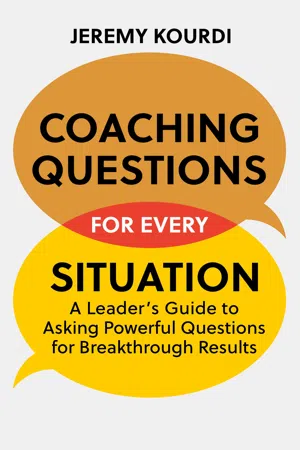
Coaching Questions for Every Situation
A Leader's Guide to Asking Powerful Questions for Breakthrough Results
Jeremy Kourdi
- 224 pages
- English
- ePUB (adapté aux mobiles)
- Disponible sur iOS et Android
Coaching Questions for Every Situation
A Leader's Guide to Asking Powerful Questions for Breakthrough Results
Jeremy Kourdi
À propos de ce livre
**Powerful coaching questions to get the best out of any situation.**In coaching, questions are the route to progress. Questions enable the people being coached to arrive at their own solutions and, crucially, to 'own' them as well. The effectiveness of this tool applies to anyone in a coaching role, whether as a leader, a professional coach, or a people management executive. A good question, asked at the right moment, can be transformative. Great questions allow coaches to influence, develop and shape someone's thinking far beyond that of their own knowledge or area of expertise, propelling the learner to new levels of insight, awareness, action and effectiveness. Coaching Questions for Every Situation delivers bags of context-specific questions to leaders and coaches right when they need them most, equipping them with the essential tools to deal with a difficult situation, raise performance or offer a moment of motivation. It includes sections on both virtual coaching and coaching across cultures.The book explains the guiding principles behind great questions as well as the pitfalls to avoid, serving as a practical guide to becoming a highly effective questioner.